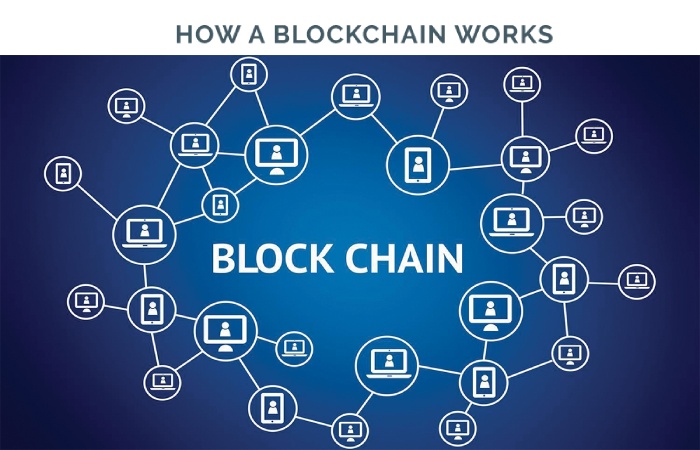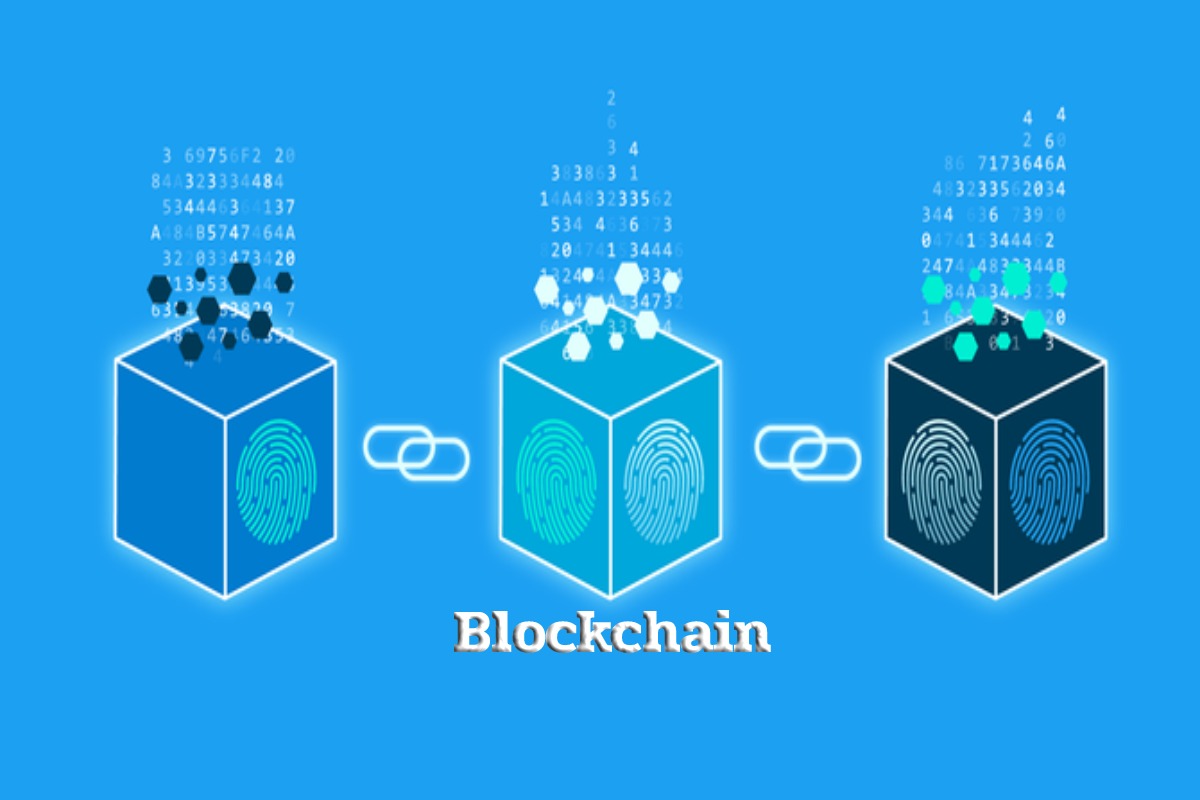What is the Blockchain?
The blockchain is a technology that allows the transfer of data completely, thanks to very sophisticated coding. It usually compares to a company ledger where all the inflows and outflows of money are recorded. But, in this case, it is a digital event book.
This transfer does not require an intermediary to verify and approve the information, but rather it distributes in various independent nodes (users) that record and validate it. Thus, when the information entered, it cannot delete. Only new records can add. Furthermore, it will not legitimize unless the mainstream of them agree to do so.
The blockchain eliminates intermediaries, decentralizing all management. The control of the process belongs to the users, and it is they who become part of a huge bank with thousands, millions of nodes, each of which becomes a participant and manager of the bank’s account books.
How does the Blockchain Work?

Until some time ago, a third party necessary that the two parties trusted to guarantee the authenticity of the transactions (bank, auditor, notary or Paypal) and had a record or seal of integrity. With the blockchain, this problem and double-spending disappear by combining P2P peer-to-peer technology with virtual currency and thus creating a new form of digital communication.
Likewise, the transactions included in the blocks are created by the members of the system. These are registered and transmitted to all nodes on the network. Thus, all members have the transaction information updated in real-time.
Transactions are made from so-called “wallets” or electronic purses. Wallets are encrypted files that work similarly to a bank account. They have two keys: public and private.
Public Key
The public key is an alphanumeric cord between 26 and 35 characters. It is the Bitcoin address and acts as the account number. In this way, you must first give them the public key and then receive the virtual currencies for someone to send you bitcoins.
Private Key
Meanwhile, the private key uses to authorize operations from your wallet. This process is what is known as unequal cryptography.
As steadily new transactions flow through the network, they will be added to a ” pool” (similar to a cooperative) transaction without checking. This is where the figure of the so-called “miners” appears, who is in charge of choosing the transactions of these pools to create a new block of confirmed transactions.
This ledger is safe because the linked blocks have a “hash” (encoded) pointer that links to the previous block; Furthermore, all information is public. This means that it protects the privacy of its users it does allow to control the traceability of those transactions.
Elements
It should be noted that each block is a part of the chain with the following elements:
- An alphanumeric code is linked to the previous block.
- A package of transactions.
- Another alphanumeric code will link to the back block.
What is the Future of the Blockchain?

Experts on the subject compare the ‘boom’ of the blockchain with milestones as the development of the Internet or the integration of computers in-home use. They point out that it is a system that will change the way of understanding business and society.
Likewise, they reveal that one of their maximum potentials will be Smart Contact (smart contracts). With blockchain technology, agreements and transactions can be made securely without revealing confidential information between the two parties. For example: selling products, renting a house, cars, etc., all online.
On the other hand, blockchain will be essential for the Internet of things. Our electronic devices will communicate with each other securely and transparently, say the experts. These smart devices will be able to buy products on the Internet automatically.
Currently, many projects are being investigated to implement the blockchain as a structure that supports them. So it will be a matter of years (or months) before we see if it will become the technology of the future.
Advantages of Blockchain
Defined what blockchain is, it is essential to know the advantages of the moment’s technology. It is unlikely to be a disruptive input that attacks traditional business models with a lower-cost solution. Instead, it is a fundamental technology that can create new foundations for economic and social systems. These are its main advantages.
1. Safety
You cannot define what blockchain is without talking about security. One of the main benefits it transports is its ultra-secure network. Because the transmitted data inherently encrypt, it is much more secure than the standard username and password system.
Decentralized data stowed using blockchain makes it extremely difficult to hack because there is no “single point of failure”. What does this mean? If all documents stored on thousands of different hard drives, it is unlikely that any data will ever lose.
Under normal circumstances, to break into a blockchain, hackers would have to overwhelm more than 50% of the network in a shorter amount of time than it takes to generate a new block. The amount of computing power obligatory to do this on most blockchain networks is tremendous. The larger ones are much more difficult to hack because they more decentralize and have more computers to verify transactions.
Furthermore, it is easy to detect when a block tampers thanks to hash functions. These values from one block add to the data in the next. Anyone who tries to tamper with one will end up changing the hash entirely, raising a red flag, and disabling the lock entirely.
2. Decentralization and Smart Contracts
The second benefit comes from decentralization and smart contracts. These use blockchain to automate payments and transfers based on a predetermined set of conditions.
With them, you can pay an electricity bill once the consumption reaches a certain amount. The transaction would send securely to the power company and verified using blockchain. Goodbye to late fees and stolen financial information.
As more transactions automate using smart contracts, the need for third-party intermediaries and organizations will decrease. Because information is spread across the entire network, it is extremely difficult for a group to control it.
Governments and individuals in locations of power will no longer be able to shut down the sources they wish to suppress because the information will exist on many computers across the network.
3. Speed and Efficiency
Third, blockchain is fast and efficient. Manual data entry is tedious and error-prone. Most organizations maintain multiple systems of record for different tasks. Reviewing them separately is time-consuming with blockchain, all this information store and verified as it generates.
Its verification speed also has great benefits. For example, a simple stock purchase may take up to a week to verify the use of current methods. There is no need for third-party verification with blockchain because all the information necessary to complete and verify the transaction included in the general ledger. That means share transfers can happen almost instantly.
By defining what blockchain is and seeing its advantages, it is verified that it prepares to change information technologies in the same way that open-source software did a quarter of a century ago. But it will take years to become a cheaper and more efficient way to share information between open and private networks.
Blockchain represents a new example of the way information share. Providers and companies are racing to discover how they can use distributed ledger technology to save administration time and costs. Numerous companies in 2017 began implementing pilot programs and real-world projects in a variety of industries, from financial services to healthcare, mobile payments, and even global shipping.
What other Uses are Given to Blockchain?
Any information that needs to preserve intact and available can store on the blockchain securely, decentralized, and cheaper than through intermediaries. In addition, if this data store encrypted, its privacy can guarantee since only those who have the encryption key can access it.
1. Use of Blockchain in Healthcare
For example, health archives could unify and stored on the blockchain. In this way, each patient’s medical history would be harmless and at the same time obtainable to each authorized doctor, irrespective of the health centre where the patient treated. Even the medicinal industry can use this technology to verify drugs and stop counterfeits.
2. Using Blockchain for Documents
On the other hand, it would be valuable for the management of digital assets and documents. Until now, the problem with digital is that all is easy to copy. Still, blockchain allows you to register purchases, deeds, documents or any digital good that cannot be forged.
3. Other Uses of the Blockchain
It can also transform the Internet of Things (IoT) market, where the challenge lies with the millions of devices linked to the Internet that the provider companies must manage. In a few years, the centralized model will not support numerous devices, not to mention that many of them are not secure sufficiently. With blockchain, devices can connect through the network directly, secure and reliable way, without intermediaries.
Blockchain allows to verification, validate, track and store all kinds of information, from digital certificates, democratic voting systems, logistics and messaging services, smart contracts and, of course, money and financial transactions.
Conclusion
Blockchain can define as a mathematical structure to store data that is almost impossible to falsify. It is a public e-book that can share openly among disparate users and creates an immutable record of your transactions.
Each digital record in the thread call a block (hence the name), and it allows an open or controlled group of users to participate in the e-book. In turn, each block link to a specific participant.
Blockchain can only update by consensus among the participants in the system, and when new data is entered, it can never erase. There is a true and verifiable record of every one of the entries made in the system.


